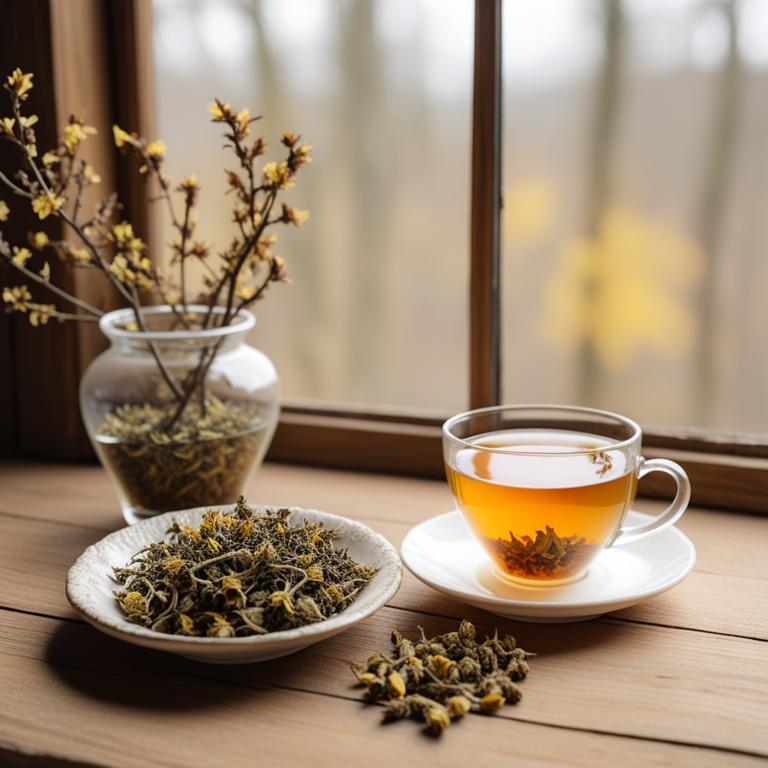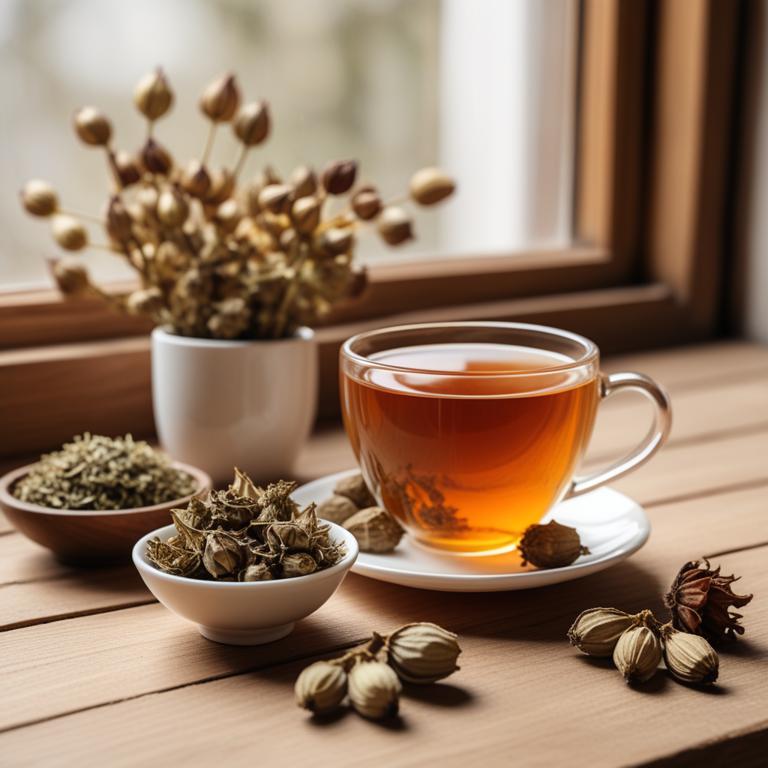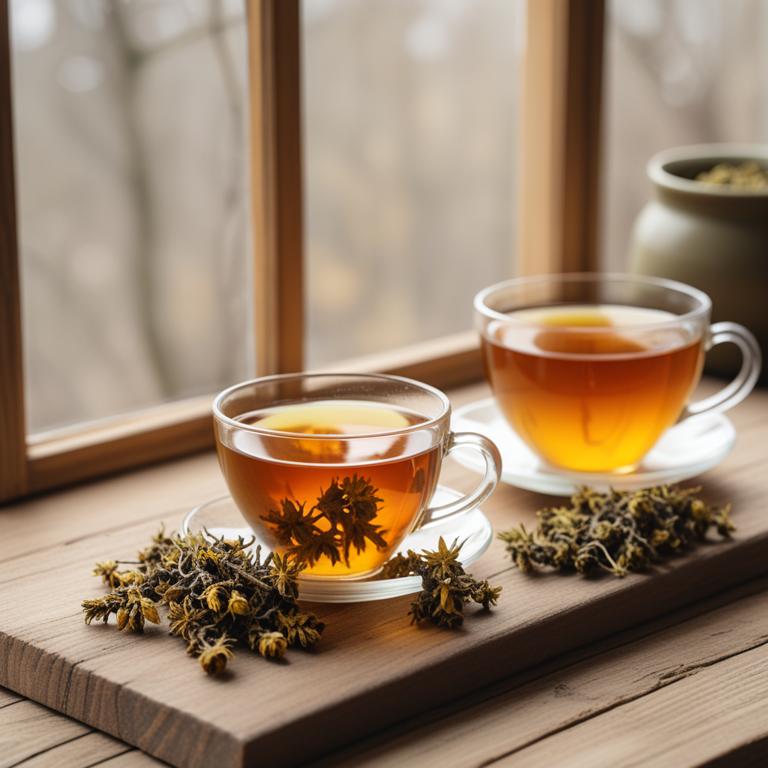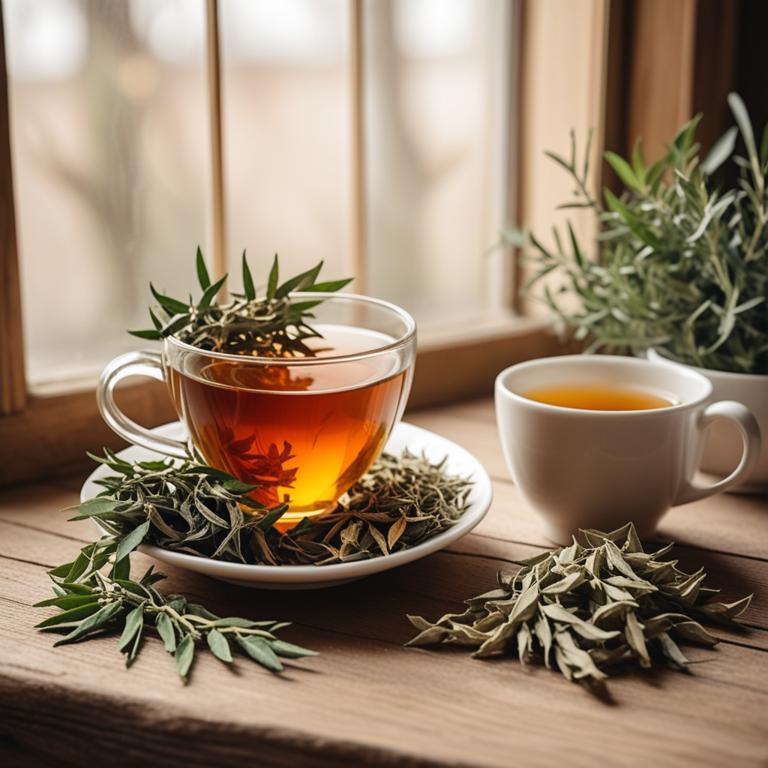11 Best Herbal Teas For Varicose Veins

Herbal teas for varicose veins are a type of natural remedy made from various plants and herbs that are used to alleviate the symptoms and promote the healing of varicose veins.
These teas have been shown to have numerous benefits, including reducing inflammation, improving circulation, and strengthening the walls of the veins, which can help to alleviate pain, swelling, and discoloration associated with varicose veins.
Examples of herbal teas that can be used to treat varicose veins include peppermint tea, which helps to improve circulation and reduce inflammation, chamomile tea, which has anti-inflammatory properties and can help to calm the nervous system, ginger tea, which helps to improve circulation and reduce pain, horse chestnut tea, which has anti-inflammatory properties and can help to strengthen the walls of the veins, butchers broom tea, which helps to improve circulation and reduce swelling, and bilberry tea, which has anti-inflammatory properties and can help to improve circulation and reduce discoloration.
By incorporating these herbal teas into your daily routine, you may be able to find relief from the symptoms of varicose veins and promote overall vascular health.
According to "Arzneimittel-Forschung", teas for varicose veins containing Red Vine Leaf Extract (RVLE) with quercetin-3-O-beta-glucuronide and isoquercitrin as main components may help reduce lower leg edema and circumference, improving symptoms of chronic venous insufficiency, and are as effective as compression stockings in reducing edema.
Below there's a list of the 11 best herbal teas for varicose veins.
- 1. Crataegus monogyna teas
- 2. Aesculus hippocastanum teas
- 3. Sambucus nigra teas
- 4. Hamamelis virginiana teas
- 5. Ginkgo biloba teas
- 6. Valeriana officinalis teas
- 7. Paeonia officinalis teas
- 8. Ruscus aculeatus teas
- 9. Hypericum perforatum teas
- 10. Urtica dioica teas
- 11. Melissa officinalis teas
Also you may be interested in...
TODAY'S FREE BOUNDLE
Herb Drying Checklist + Herbal Tea Shopping List + Medicinal Herbs Flashcards
Enter you best email address below to receive this bundle (3 product valued $19.95) for FREE + exclusive access to The Aphotecary Letter.
$19.95 -> $0.00
1. Crataegus monogyna teas

Crataegus monogyna teas have been traditionally used to treat varicose veins due to their anti-inflammatory, antioxidant, and vasoconstrictive properties, which help to reduce swelling and alleviate pain.
The bioactive constituents present in this herbal preparation, including flavonoids, phenolic acids, and saponins, contribute to its therapeutic effects by improving blood circulation, reducing inflammation, and strengthening blood vessel walls.
As a result, Crataegus monogyna teas have been found to help alleviate symptoms associated with varicose veins, such as swelling, pain, and discoloration of the skin.
The benefits of using this herbal preparation to treat varicose veins include improved circulation, reduced inflammation, and enhanced overall vascular health.
2. Aesculus hippocastanum teas

Aesculus hippocastanum teas, also known as horse chestnut teas, have been traditionally used to treat varicose veins due to their anti-inflammatory and venoactive properties.
The bioactive constituents of Aesculus hippocastanum, including flavonoids and saponins, help to improve blood vessel tone and reduce vascular permeability, which can alleviate symptoms of varicose veins.
By reducing inflammation and improving blood flow, Aesculus hippocastanum teas can help to alleviate pain, swelling, and discoloration associated with varicose veins.
Regular consumption of Aesculus hippocastanum teas may also help to strengthen blood vessel walls and improve overall venous health.
3. Sambucus nigra teas

Sambucus nigra teas have been used for centuries to treat varicose veins due to their anti-inflammatory and antioxidant properties, which help to improve blood circulation and reduce inflammation in the affected veins.
The flavonoids and phenolic acids present in Sambucus nigra teas, such as quercetin and kaempferol, are responsible for their therapeutic effects, including reducing oxidative stress and promoting vascular health.
By reducing inflammation and improving blood circulation, Sambucus nigra teas can help to alleviate the symptoms of varicose veins, including pain, swelling, and discoloration.
The benefits of using Sambucus nigra teas to treat varicose veins include reduced risk of complications, improved overall health, and a natural alternative to conventional treatments.
4. Hamamelis virginiana teas

Hamamelis virginiana teas have been traditionally used to treat varicose veins due to their anti-inflammatory, antiseptic, and astringent properties.
The herbal preparation helps to treat this ailment by reducing inflammation, improving blood circulation, and strengthening blood vessel walls.
The bioactive constituents of Hamamelis virginiana, including tannins, flavonoids, and phenolic acids, contribute to its therapeutic effects by exerting antioxidant and anti-inflammatory actions.
Regular consumption of Hamamelis virginiana teas may help alleviate symptoms of varicose veins, such as pain, swelling, and discoloration, and promote overall vascular health.
5. Ginkgo biloba teas

Ginkgo biloba teas are a natural herbal remedy that has been used to treat varicose veins due to its anti-inflammatory and antioxidant properties.
The flavonoids and terpenoids present in Ginkgo biloba teas help to improve blood circulation and reduce inflammation in the veins, alleviating symptoms such as swelling and pain.
The bioactive constituents of Ginkgo biloba teas, including bilobalide and ginkgolides, have been shown to improve venous tone and reduce capillary fragility, which can contribute to the development of varicose veins.
Regular consumption of Ginkgo biloba teas can help to reduce the severity of varicose veins, improve overall circulation, and alleviate symptoms associated with this condition.
Related Study
According to "Presse medicale (Paris, France : 1983)", Ginkgo biloba teas may help correct capillary defects associated with varicose veins by reducing capillary hyperpermeability.
6. Valeriana officinalis teas

Valeriana officinalis teas are a herbal preparation that has been traditionally used to treat varicose veins due to its soothing and anti-inflammatory properties.
The valerenic acid, isovaleric acid, and valepotriates present in Valeriana officinalis teas help to improve blood circulation and reduce inflammation, thereby alleviating the symptoms of varicose veins.
By promoting relaxation and reducing stress levels, Valeriana officinalis teas can also help to alleviate the discomfort and pain associated with varicose veins, allowing for improved mobility and reduced swelling.
The benefits of using Valeriana officinalis teas to treat varicose veins include reduced risk of complications, improved overall health, and a natural alternative to conventional treatments.
7. Paeonia officinalis teas

Paeonia officinalis teas have been traditionally used to treat varicose veins due to their anti-inflammatory, antioxidant, and vasoprotective properties.
The bioactive constituents present in Paeonia officinalis teas, such as paeonol and paeoniflorin, help to improve blood circulation, reduce inflammation, and relax the blood vessels, thereby alleviating the symptoms of varicose veins.
The herbal preparation helps to treat varicose veins by strengthening the vein walls, reducing swelling, and promoting the breakdown of blood clots.
The benefits of Paeonia officinalis teas in treating varicose veins include reduced pain and discomfort, improved circulation, and enhanced overall vascular health.
8. Ruscus aculeatus teas

Ruscus aculeatus teas have been used as a natural remedy to treat varicose veins due to their anti-inflammatory, antioxidant, and vasoprotective properties.
The bioactive constituents present in this herbal preparation, including flavonoids, phenolic acids, and saponins, help to improve blood circulation, reduce inflammation, and strengthen blood vessel walls, thereby alleviating the symptoms of varicose veins.
The regular consumption of Ruscus aculeatus teas has been found to promote the repair and regeneration of damaged tissues, improve overall vascular health, and reduce the risk of complications associated with varicose veins.
Overall, the benefits of Ruscus aculeatus teas in treating varicose veins include reduced swelling, pain, and discomfort, as well as improved overall well-being and quality of life.
Related Study
According to "Planta medica", Ruscus aculeatus teas for varicose veins are effective due to their vasoconstrictive and venotonic properties, which are attributed to the presence of compounds such as ruscogenin and neoruscogenin.
9. Hypericum perforatum teas

Hypericum perforatum teas, also known as St. John's Wort, have been traditionally used to treat varicose veins due to their anti-inflammatory and antioxidant properties.
The bioactive constituents of Hypericum perforatum, such as hyperforin and hypericin, help to improve blood circulation, reduce inflammation, and promote the healing of damaged veins.
By strengthening blood vessel walls and improving circulation, Hypericum perforatum teas can help to alleviate symptoms of varicose veins, such as pain, swelling, and discoloration.
Regular consumption of Hypericum perforatum teas may also provide benefits in reducing the risk of complications associated with varicose veins, including blood clots and ulcers.
10. Urtica dioica teas

Urtica dioica teas, also known as stinging nettle tea, have been traditionally used to treat varicose veins due to its anti-inflammatory and vasoconstrictive properties.
The bioactive constituents, such as flavonoids and triterpenoid saponins, in this herbal preparation help to improve blood circulation and reduce inflammation in the veins, thereby alleviating the symptoms of varicose veins.
The anti-inflammatory properties of Urtica dioica teas help to reduce swelling and pain in the affected veins, while its vasoconstrictive properties help to improve blood flow and reduce the visibility of varicose veins.
Regular consumption of Urtica dioica teas has been found to be beneficial in treating varicose veins, promoting overall vascular health, and reducing the risk of complications associated with this condition.
11. Melissa officinalis teas

Melissa officinalis teas have been traditionally used to treat varicose veins due to their soothing and anti-inflammatory properties.
The bioactive constituents present in Melissa officinalis, such as rosmarinic acid and flavonoids, help to improve circulation, reduce inflammation, and promote tissue repair, which can alleviate symptoms of varicose veins.
This herbal preparation works by strengthening the walls of blood vessels, improving blood flow, and reducing oxidative stress, ultimately helping to alleviate pain, swelling, and discoloration associated with varicose veins.
The benefits of using Melissa officinalis teas to treat varicose veins include reduced inflammation, improved circulation, and a decrease in the risk of complications such as blood clots and skin ulcers.